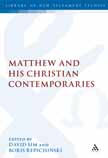 Wayne Leman over at the Better Bibles Blog has posted on the translation of Greek articles here, focusing specifically on occurrences of “the house” in Matthew where a house has not previously been introduced in the text. One discourse pattern we often find is that definite nouns are used only after that noun has been introduced in the text in an indefinite manner. However, definiteness is not always dependent on the article in Greek. I have posted my response to Wayne in the comments of his post. I’ll only repeat part of that here…
Wayne Leman over at the Better Bibles Blog has posted on the translation of Greek articles here, focusing specifically on occurrences of “the house” in Matthew where a house has not previously been introduced in the text. One discourse pattern we often find is that definite nouns are used only after that noun has been introduced in the text in an indefinite manner. However, definiteness is not always dependent on the article in Greek. I have posted my response to Wayne in the comments of his post. I’ll only repeat part of that here…
When I read “the house” in the gospels about a house that I have not been introduced to yet, this communicates to me that there was a definite house that Jesus was going to. If the translation were to say “a house,” that would sound to me like Jesus was aimlessly meandering and randomly came across any house when he felt like it was time to stop. So in some of these cases, the ‘the’ doesn’t have to have the same discourse function that we often think of when it is used to refer back to a previously introduced noun. Rather, the article conceptualizes the noun in a certain way (perhaps even making it definite, although it is true that definiteness is not ultimately dependent upon the Greek article) for other reasons besides its previous occurence in the text.In Mt. 9:28, I like what the NLT has done here with “the house where he was staying.” That has the effect of communicating a certain definiteness, and it seems to be a very likely referent that is not too overly specific without other clues. Often times “going into the house” in Greek is the equivalent of our English “going home.” On the other hand, isn’t it possible that “the house” refers to Matthew’s house, the last house we hear of before Jesus was summoned to go to the synagogue leader’s house? Maybe not, since that interpretation would assume that Jesus stayed there for more than just dinner and was there for several days during which the disciples of John the Baptist came to him before the synagogue ruler came to him. Probably quite unlikely. Therefore, it seems that the best option is that Jesus is still in his own town (cf. 9:1), so “the house” is probably whatever house he’s staying in, perhaps even a family house, or ‘home’ as “the house” often means in Greek.
As for 13:36, it’s very possible that Jesus is back in his home town again, since 12:15 says that he left the area he had gone to after he left his home town. Also, his mother and brothers are back in the picture in 12:46. Mt. 13:1 refers to Jesus leaving “the house” and so 13:36 refers to him going into “the house.” It’s the same one he left, very definite even if we don’t want to go so far as to say it was his family home.
As for 17:25, this is Peter’s home town, (cf. Mt. 4:18) and we know that Peter’s mother-in-law had a house there (Mt. 8:14), so this is probably one of those places where “the house” is best understood as the definite idea of ‘home’.
Mt. 24:43 has “the house of him” because it has already referred to the ‘homeowner’.
Daniel Wallace discusses the uses and non-uses of the Greek article in Greek Grammar Beyond the Basics, pp. 206-290. I have summarized his discussion in 4 pages if anyone is interested.
As for the differences between the Greek and English uses of the article, it is best to try to identify why a Greek noun has the article in particular instances before deciding if the same meaning is communicated in English with or without the definite article.
